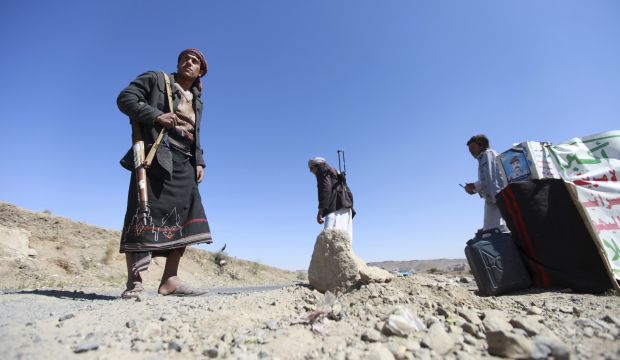
Shi'ite Houthi rebels man a checkpoint at the southern entrance to the city of Sana'a, Yemen, on November 15, 2014.(Reuters/Mohamed Al-Sayaghi)
Sana’a, Asharq Al-Awsat—Oil and gas reserves and facilities in Yemen’s main oil and gas hub are “in danger,” according to the governor of the Ma’rib province, as the Houthi movement continues its attempts to advance on the region.
Speaking to Asharq Al-Awsat, the province’s governor, Sheikh Sultan Al-Arada, said the Shi’ite group was seeking to “destabilize the security and stability of Ma’rib,” which produces more than 70 percent of Yemen’s oil and gas and acts as the country’s main electricity generation hub.
“The Ma’rib province is tied to the daily lives of the people of Yemen, because the province produces [most of] our oil, gas and electricity. When these assets are attacked, it affects the whole country,” he said.
There have been several reports of a growing Houthi presence outside Ma’rib, with the group saying it seeks only to secure the province’s facilities, but Arada said “it would be more appropriate for them [the Houthis] to safeguard security in the areas they already control before they come and talk about safeguarding it here in Ma’rib.”
The Houthi movement has been in virtual control of Yemen’s capital, Sana’a, and other parts of the country since September, when armed members of the group spread across the city taking over government buildings and facilities, unopposed by the Yemeni police and military.
Arada said the Houthi takeover of Sana’a had been “very frightening” for the people of Ma’rib, and for that reason the province had planned early on for a possible advance by the group.
He said he had been approached indirectly by the group, which asked him to broker an agreement between local tribes and tribes allied to the Shi’ite group to enter the province, but he had refused.
Ma’rib’s tribes have said they are ready to defend the province in the event of a Houthi takeover in the manner of their advance on Sana’a, Arada said.
“The sons of Ma’rib will only accept the presence of state security forces in their province. They therefore refuse the presence of any armed groups or militias. This is unacceptable and something we reject totally,” he said.
A visiting parliamentary delegation had signed an agreement with the province’s tribes mandating them to stand by the state in protecting the region and defending it against “negative phenomena such as terror attacks, acts of sabotage, and the activities of militias or armed groups,” he said.
“In this way, we have blocked this pretense which some are hiding behind when they claim they wish to protect the interests of the province,” he said, in reference to the Houthis, adding that Ma’rib’s tribes were fully “standing by the state in the face of anyone who wishes to destabilize its security and stability, especially in light of the Houthis now having reached Ma’rib’s borders.”
Meanwhile, 54 million dollars’ worth of food supplies provided by Saudi Arabia to Yemen to help ease the current effects of the dire economic conditions in the country—the Arabian peninsula’s poorest—began being distributed on Sunday.
Speaking to Asharq Al-Awsat, the Saudi ambassador to Yemen, Mohammed Bin Said Al Jabir, said the Custodian of the Two Holy Mosques King Abdullah Bin Abdulaziz “would spare no effort to help Yemen and keep it united.”
He added that the help given by Saudi Arabia was “not motivated by any ulterior motive” and that it was offering aid “to all of Yemen’s people without any bias.”
“The security of Yemen is part of the Kingdom’s and the Gulf’s, and the wider world’s, as well,” he added.
Additional reporting by Arafat Madabish.
